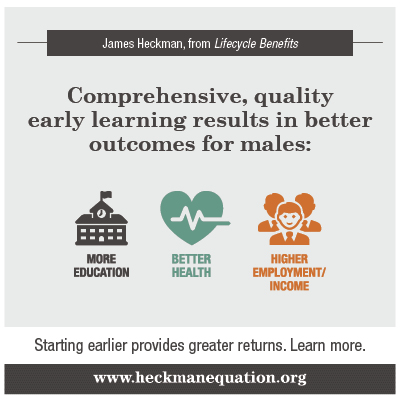There’s Much to Gain by Investing in High-Quality, Early Childhood Education Programs
|
In the 2018 midterm elections, candidates across the political spectrum ran on platforms that included expansion and support of early education and childcare assistance programs. In many ways, this signals an increased awareness by our country’s representatives that families and communities are struggling to afford high-quality care, even for dual-earner households.
There is a substantial body of evidence showing the impact of high-quality early childhood programs on school readiness and early social and cognitive growth for disadvantaged kids. Less is known about how these programs impact health, social, and economic outcomes over the long term.
High-Quality Early Childhood Education Has Long-Term Benefits
Our research team, led by Dana Goldman and James Heckman, investigated the social benefits and costs of a pair of essentially identical early childhood programs: The Carolina Abecedarian Project (ABC) and the Carolina Approach to Responsive Education (CARE). These programs were part of a randomized-controlled preschool experiment conducted in North Carolina in the 1970s. They provided comprehensive care to under-resourced children from birth to age five including meals, health care services and early learning. The participants were followed into adulthood, allowing us to track specific outcomes, as well as predict the future costs and benefits of these programs for participants.

For female participants in the program, ABC/CARE had positive effects on high school graduation, years of education, adult employment and the adult labor incomes of participants and their parents. Male participants also saw positive effects on education and later labor incomes, but the long-term health effects for these children were particularly compelling, showing lower drug use, blood pressure, and hypertension.
Additionally, the program had a strong effect on the mother’s income and educational attainment which persisted through the participant reaching 21 years of age, signifying this program positively impacted the economic outcomes of the children as well as their parent(s).
All told, ABC/CARE represents a 13.7 percent per-year, return on investment (tax-adjusted). Our benefit/cost analysis predicts the program generates a benefit of over $7 for every dollar spent. Therefore, while high-quality, early childhood interventions are viewed by some as “expensive” they might instead be viewed as equitable and efficient investments.
Making the Case for High-Quality Early Childhood Education
Existing research on the effectiveness of early childhood programs largely focuses on short-term academic gains. Yet the more relevant measure of value is the long-term health, social and economic benefits produced. We have powerful evidence that high-quality early childhood education is a cost-effective strategy for supporting life-long health outcomes, promoting economic growth, and reducing social costs. Early efforts to coordinate these early childhood resources into a “scaffolding” of developmental support for children have been promising, and we look forward to continued bipartisan momentum around this critical issue.
Photo by weedezign/Shutterstock
Related Projects
-
September 15, 2016
|Has Evidence
| -
Mental and Behavioral HealthCalifornia Diversion: Mental Health, Racial Equity, and Criminal Court
September 1, 2021
|Has Evidence
| -
Community Justice and Public SafetyAre Cities and Counties Ready to Use Racial Equity Tools to Influence Policy?
December 15, 2018
|